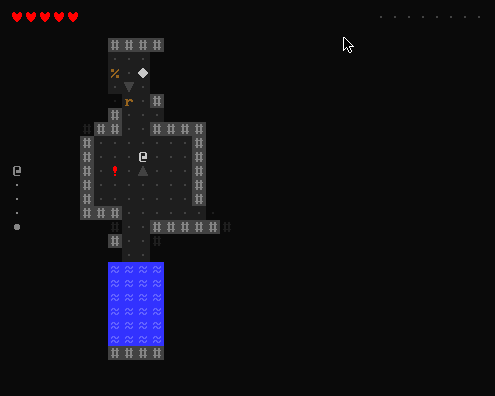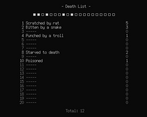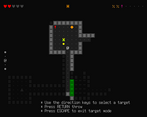Play game
Ars Moriendi's itch.io pageResults
| Criteria | Rank | Score* | Raw Score |
| Completeness | #1 | 4.000 | 4.000 |
| Roguelikeness | #1 | 4.000 | 4.000 |
| Scope | #4 | 3.333 | 3.333 |
| Aesthetics | #8 | 3.667 | 3.667 |
| Overall | #11 | 3.500 | 3.500 |
| Fun | #38 | 3.000 | 3.000 |
| Innovation | #40 | 3.000 | 3.000 |
Ranked from 3 ratings. Score is adjusted from raw score by the median number of ratings per game in the jam.
Judge feedback
Judge feedback is anonymous and shown in a random order.
Well done! The game feels complete and well polished. The aesthetics are good with descriptive text and easily readable game play (except % food, isn't explained). I had fun reviewing the game and its definitely worth someone's time to try it out. The focus on counting the types of deaths is a neat twist on the usual mechanics while not fundamentally a new innovation. The scope is what I'd expect from a 7DRL but I would like to see more variety. Definitely fits the description of a roguelike.
Ars Moriendi is a nicely scaled roguelike – the maps are a small, digestible size, your health is tracked as a small integer, there are usually only a handful of enemies per level. This small scale does more than simply make for quick playthroughs, it really supports many of the other mechanics in the game. The smallness of the map means that monsters are a hazard that are hard to avoid, and also that you don’t feel bad when you bypass parts of the map when you find the stairs early. Also, because the game has a meta goal of finding 20 different ways to die, the small scale of the dungeon doesn’t punish multiple, exploratory playthroughs. I found this meta goal really effective at taking the sting out of what would have been otherwise frustrating deaths…the first time I encountered and got slammed by a Dragon in an otherwise impassable hallway really was made more fun by seeing a Congratulations! pop up afterward.
The visuals don’t deviate from the modern roguelike formula, but they are legible and communicate clear gamestates. I think some minor visual variation between floors could have been nice (rather than just variation in enemies/traps), but that’s not a huge critique. I also would have personally appreciated the ability to make the visuals larger…not for legibility’s sake, it would have just been fun to have bigger, chunkier graphics. Mechanically, I found myself wanting there to be just one weapon item for you to find, to make attacking orcs and trolls more possible, but I understand why the author didn’t introduce that complexity to the mix -- instead really leaning on the throwing mechanic. I think this project tidily accomplished the author’s goals. It would be cool to think through such a meta-death-seeking roguelike that pushed the mechanics further out of the norm…perhaps becoming a ghost on death and continuing until you could find a new body, or using death to solve puzzles rather than tick off achievements. But that's just speculation in response to a nice, playable, complete roguelike.
Ars Moriendi is a roguelike in which you have to explore the ways and powers of death itself. There are 20 ways to die with a trophy list and your stats. Death can come at any corner and there are some silly moments that will make you smile.
The game is set in a small 5-level generated dungeon containing traps, monsters, and items to help you in your progression. The game implements hunger, so pack on food early.The looks and mechanics are reminiscent of a classic roguelike with an ascii dungeon, fov, turn-taking, vi keys, an all that's needed. It is a very good implementation of a coffee-break game given the size of the dungeon (< 5 minute to reach the last level). But death is also very quick to come. Easy enemies are 1 hit, and harder get to 2 or 3 hits. Ennemies like trolls and dragons are challenging and you need to bring extra gear to tackle them.
I really like the dead simple interface (no pun intended) which indicates without any textual descriptions your HP, inventory and the dungeon level in which you are. I also like the animations for throwing and hitting something.
The game suffers from occasional bugs, such as the weird wall lighting and you might get surprised by ennemies you couldn't see until it's too late.
Nevertheless, the game is well in scope, and a finished piece of roguelike with polish and many features. The ways to die are diverse and finding them is fun, but I am not sure how this innovation changes the genre. I feel like I just played a normal roguelike until I had no other opportunity than dying.
Successful or Incomplete?
Leave a comment
Log in with itch.io to leave a comment.









Comments
Gorgeous tileset and menus, this is on my list.